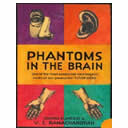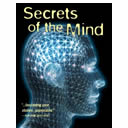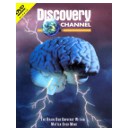Phantoms in the Brain
 The writings of Oliver Sacks and others have shown us that we can learn much about ourselves by looking closely at the deficits shown by people with neurological problems. V.S. Ramachandran has seen countless patients suffering from anosognosia, phantom limb pain, blindsight, and other disorders, and he brings a remarkable mixture of clinical intuition and research savvy to bear on their problems.
The writings of Oliver Sacks and others have shown us that we can learn much about ourselves by looking closely at the deficits shown by people with neurological problems. V.S. Ramachandran has seen countless patients suffering from anosognosia, phantom limb pain, blindsight, and other disorders, and he brings a remarkable mixture of clinical intuition and research savvy to bear on their problems.
He is one of the few scientists who are able and willing to explore the personal, subjective ramifications of his work; he rehumanizes an often too-sterile field and captures the spirit of wonder so essential for true discovery.
Phantoms in the Brain is equal parts medical mystery, scientific adventure, and philosophical speculation. Whether you’re curious about the workings of the brain, interested in alternatives to expensive, high-tech science (much of Ramachandran’s research is done with materials found around the home), or simply want a fresh perspective on the nature of human consciousness, you’ll find this to be an interesting documentary.




I often ask myself; Who would I like to have over as dinner guests? I'll take Dr. Ramachandran and of course Neil DeGrasse Tyson. What a night THAT would be!
The mirror trick to ease phantom pain is so simple yet so clever!
I never knew Dr. Ramachandran, was an illusionist also.
Dr. Ramachandran is brilliant!
He really is indeed.
interesting
great stuff! very interesting!!
The concept of brain plasticity and neuronal function as they relate to the somatosensory cortex is a fascinating area of research. Fascinating enough that I changed my major from psychology to neuroscience.
We are just beginning to understand how our highly evolved brains function.
If you like this documentary you should pick up the book by the same name - as you might imagine, it goes into greater depth on these and other cases. Fascinating!
I first saw V.S. Ramachandran on TED, a couple of very interesting talks on this subject.
I like the way he communicates, a very interesting speaker!
THANK YOU for sharing this documentary - I was mesmerised, and I found so many parts of it relative. So much so, that I had to write a letter to my Psychiatrist as soon as it finished, it made me cry with relief.
I have just posted my letter to him, and Im back here to blog my gratitude, and to ask if anybody else here felt strong feelings of empathy? Id love to hear your comments?
-
@ Epicurean_logic
I totally understand what you are saying - Im fascinated, can you explain more? dont worry if you cant, I understand that some experiences go beyond the paranormal and are difficult to talk about respect, Sade
This is have NOTHING to do with Psychology.
It's neurology. Brain damaging, not personality issues.
And yes Ramachandran is one of the best neurologists :)
This is Neuropsychology; neurology it's not interested on function or cognition, that is the remit of psychology; hence, Neuropsychology and it has been around for over 100 years.
The separation of the two categories is arbitrary, often influenced by beliefs rather than proven scientific observations. Neurological disorders often alter levels of consciousness. To say that neurology is not interested in cognition and cognitive functioning is incorrect.
Well just how dumb are you... This is psychology, cognitive neuroscience is looked at when studying psychology. How the brain works and what importance and effect it has on our behaviour... its not all about narcissists and psychopaths you know.
Amazing stuff.
Epicurean_Logic - i know what You mean about the head buzzing, never been able to describe it before, so ThankYou :)
I dunno about you guys, but whenever i think about conciousness for too long my temporal lobes start to buzz with sensation. The only other thing that does that to me is listening to Callas or Piaff. Strangely enough doing tough maths problems makes the top of my head buzz. yeah, i know, it's weird. It must have something to do with over-working those areas of the brain.
This is surely one of those things that no-one else has considered or felt. But what the heck i'll put it out there.
Really interesting documentary. Good stuff.
Very interesting indeed. I heard some of the clinical examples in lectures of the philosophy of consciousness before. I have to say though that I felt sometimes a bit sorry for the patients with the doctor discussing their "defects" right in front of them. But nevertheless it makes you think also as a "healthy" human being how you actually perceive reality.
In the last part I saw some striking similarity between the states of mind the guy with epilepsy in the temporal lobe described and the effects of entheogenic compounds on some people.
This is reaaly good.
Man I would LOVE to have a conversation with that man.
Excellent and very useful documentary.
I am so thrilled that you have this documentary here! I have followed Oliver Sacks for ages and had looked for this BBC documentary but had trouble finding it. Thanks :)
Fascinating.